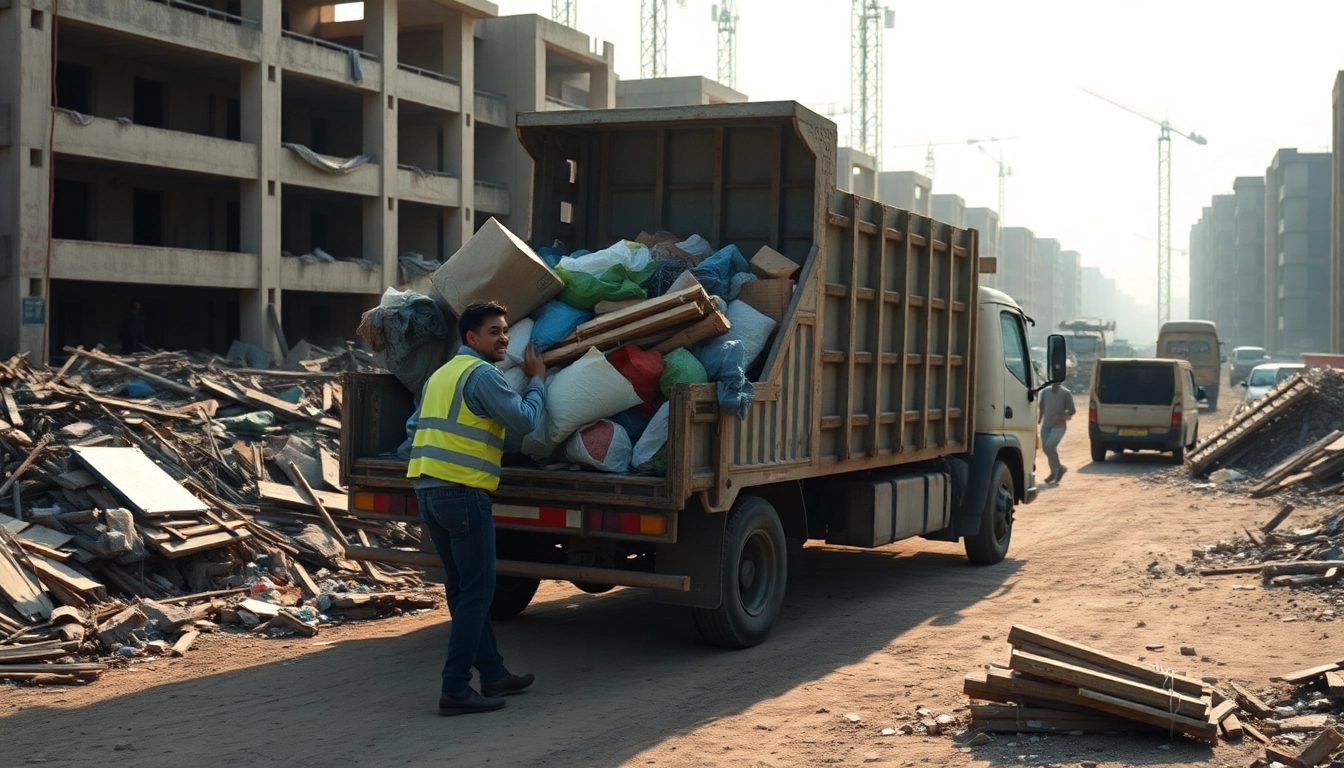Understanding Builder Rubbish Removal Services
What Are Builder Rubbish Removal Services?
Builder rubbish removal services encompass a range of professional solutions designed to manage waste generated from construction projects. These services aim to streamline the disposal of debris, ensuring that it is handled safely and efficiently. Whether you are undertaking a small renovation or a large-scale building project, Builder Rubbish Removal Services are crucial for maintaining a clean and organized work site.
Typically, these services include the collection, transportation, and disposal of various types of waste, including concrete, wood, metal, and other materials that accumulate during the construction process. Professional rubbish removal companies are equipped with the necessary tools and vehicles needed to handle large volumes of waste, following strict regulations to ensure environmentally friendly disposal methods.
Importance of Professional Rubbish Removal
Engaging professional rubbish removal services is not merely a matter of convenience; it is vital for several reasons. Firstly, construction sites can quickly become unsafe if debris and waste are not managed effectively. Uncluttered work areas reduce the risk of accidents and injuries, which is a paramount concern in construction. Secondly, construction waste can harm the environment if not disposed of correctly. By utilizing professional services, builders can ensure compliance with local regulations, minimizing the company’s legal liabilities.
Additionally, leveraging professional rubbish removal helps expedite project timelines. Builders can focus on their core tasks while leaving waste management to experts trained in efficient disposal strategies. This ensures that projects are completed on schedule, ultimately improving client satisfaction.
Common Types of Builder Waste
Builder waste is diverse and multifaceted, often categorized into several types. Understanding these categories can help in effective management:
- Concrete and Masonry: This constitutes a substantial portion of building site waste and includes broken bricks, blocks, and leftover mix.
- Wood and Timber: Scrap wood from construction activities can contribute to a significant volume of rubbish, creating a need for effective disposal methods.
- Metal: Metal waste includes remnants from installations, such as pipes and roofing materials.
- Plastics: Items like packaging, insulation materials, and remnants from installed fixtures fall into this category.
- Miscellaneous Waste: This can include furniture, appliances, and other items that are not construction-related but may end up on a worksite.
Benefits of Using Professional Services
Cost-Effective Solutions for Builders
One of the primary benefits of employing professional rubbish removal services is the potential for cost savings. While it may seem more economical to handle waste disposal in-house, the hidden costs often stack up. These include expenses related to manpower, vehicles, fuel, and potential fines for improper disposal. Professional services streamline the process by offering fixed rates that cover all aspects of waste removal. This predictability allows builders to budget more effectively and avoid unexpected expenses.
Moreover, professional rubbish removal companies often have established partnerships with recycling facilities. This can lead to lower disposal fees for materials that can be recycled or repurposed, thus further reducing overall costs. By effectively managing waste and minimizing landfill contributions, builders can see significant savings over time.
Environmental Impact of Proper Waste Disposal
Constructing buildings and infrastructure inevitably result in a substantial carbon footprint, and while some of this is unavoidable, improper waste management can exacerbate the environmental impact. Utilizing professional rubbish removal services contributes positively to the environment in various ways. Firstly, these services often adhere to stringent regulations regarding waste disposal, ensuring that materials are sorted properly and diverted from landfills. This responsible approach not only minimizes harm to the environment but also promotes recycling and reuse of materials.
Additionally, professional waste management companies often implement eco-friendly practices, such as using environmentally friendly disposal methods or investing in technologies that reduce emissions from vehicles. When builders align themselves with such services, they also enhance their corporate social responsibility (CSR) image, which can attract clients who prioritize sustainability.
Time-Saving Techniques for Project Management
Time management is a crucial aspect of any construction project. Delays in waste removal can lead to stoppages in work, contributing to extended project timelines and increased costs. Professional rubbish removal services provide instant solutions for clearing waste efficiently, allowing builders to maintain momentum on site. With dedicated crews trained in quick and safe removal techniques, builders can adhere to their schedules more effectively.
Furthermore, many rubbish removal companies offer flexible scheduling, accommodating the unique demands of construction projects. This adaptability ensures that waste is removed promptly, freeing up valuable space and allowing workers to operate in safe and organized environments.
Choosing the Right Rubbish Removal Partner
Key Factors to Consider When Selecting a Service
When selecting a rubbish removal partner, several factors must be considered to ensure that the service meets your specific needs. Firstly, assess the experience and reputation of the company. A provider with a solid track record in the construction industry is more likely to understand the unique challenges and requirements associated with builder waste. Look for testimonials, case studies, or reviews to gauge their effectiveness and reliability.
Secondly, consider the range of services offered. A comprehensive rubbish removal service should be capable of handling various types of builder waste and should ideally have recycling capabilities. Additionally, check the company’s compliance with local regulations regarding waste disposal. This ensures that your operations adhere to necessary legal standards and environmental guidelines.
How to Evaluate Service Providers
Evaluating service providers requires conducting thorough research and comparison. Start by requesting quotes from multiple companies to understand your options and the associated costs. While pricing is important, it shouldn’t be the only deciding factor; consider value for money and the specific services included in the quote.
After obtaining quotes, analyze each service provider’s transparency. A reputable company should be open about its processes, fees, and any additional costs that may arise. Communication is also key; assess how responsive they are to inquiries and their willingness to answer questions. This can be indicative of the service level you can expect.
Questions to Ask Before Committing
Before finalizing a partnership, it is crucial to ask the right questions to ensure alignment with your project’s needs. Consider inquiring about the following:
- What types of waste do you handle, and do you have recycling capabilities?
- How quickly can you mobilize for waste removal, especially during peak times?
- Do you hold necessary licenses and insurance to operate?
- Can you provide references from previous clients in the construction industry?
- What are your disposal and recycling practices to ensure environmental safety?
- How do you manage unexpected waste overflow situations?
Asking these questions not only helps clarify the service provider’s capabilities but also sets clear expectations for both parties.
Best Practices for Builder Waste Management
Strategies for Reducing Construction Waste
Effective waste management begins long before the rubbish removal process. Implementing waste reduction strategies during the planning and building stages can significantly minimize overall waste generation. Start by utilizing a detailed project plan that includes waste management considerations. Ensuring accurate measurements and material procurement can lead to less excess material on site.
Incorporate modular construction techniques whenever possible. This approach often leads to decreased waste since components are prefabricated and shipped directly to the site. Additionally, building companies should promote a mindset focused on reuse and recycling among team members. By encouraging employees to consider alternatives to disposal, such as donating surplus materials or repurposing them for other projects, significant reductions in waste can be achieved.
Innovative Recycling Options for Builders
With advancements in recycling technology, construction companies can adopt innovative solutions to handle their waste. Partnering with local recycling facilities that specialize in construction materials can maximize recycling efforts. These facilities often have specific programs in place to process wood, metal, and concrete waste efficiently. Moreover, educating team members on separating recyclables from general waste during construction can greatly enhance recycling rates.
Another innovative strategy is to employ technology in managing waste. Programs that track material usage on-site can provide builders with insights into where excess waste occurs, allowing for targeted reduction efforts. Furthermore, incorporating waste-diversion plans within project scopes can encourage construction teams to prioritize recycling over disposal.
Case Studies on Efficient Waste Removal
Examining successful case studies can provide valuable insights into effective waste management practices. Take, for instance, the reconstruction of a major urban infrastructure project, where the builders aimed to minimize environmental impact. By implementing a waste measurement system, the team was able to identify areas for improvement early in the project. They created a comprehensive waste-dedication plan, reducing their landfill contributions by 40% compared to prior projects.
Another example can be seen in a residential development where a contractor collaborated with a local waste removal service specializing in construction debris. By working together to recycle as much material as possible, the contractor was able to end the project with a negligible amount of waste sent to landfills, subsequently setting a precedent for future developments in the area.
Performance Metrics for Rubbish Removal Services
Measuring Efficiency in Waste Removal
Understanding performance metrics is essential for evaluating the effectiveness of rubbish removal services. Key performance indicators (KPIs) such as response time, the volume of waste removed, and customer satisfaction ratings should be monitored regularly. Additionally, the percentage of waste diverted from landfills can serve as a crucial metric indicating the service’s commitment to sustainable practices. Regular reviews of these metrics can help construction teams refine their waste management strategies and partnerships.
Alongside quantitative data, qualitative feedback from on-site personnel regarding the ease and efficiency of waste removal processes can provide further insights into performance and areas for improvement. A responsive service that adapts to the dynamic needs of construction sites will likely correlate to increased overall project efficiency.
Analyzing Cost vs. Benefit in Services
When assessing rubbish removal services, it is vital to conduct a thorough cost-benefit analysis. This involves not only evaluating the costs associated with hiring the service but also considering the long-term financial benefits of proper waste management. Factors such as reduced liability, increased safety, and potential environmental credits should be factored into the overall equation.
Additionally, cost predictions should include potential savings derived from recycling, as many materials can be diverted from costly landfill fees. By presenting a clear financial outline that demonstrates the tangible benefits of efficient waste removal, construction companies can make more informed decisions when selecting service providers.
Client Testimonials and Satisfaction Ratings
Incorporating client testimonials and satisfaction ratings can significantly enhance the credibility of rubbish removal services. Gathering feedback from previous clients can provide valuable insights into the reliability, efficiency, and customer service offered by a provider. Testimonials highlighting successful partnerships or innovative solutions to waste management challenges can illustrate a provider’s ability to meet diverse needs. Furthermore, satisfaction ratings can be accumulated through online reviews or surveys. Consider platforms such as Google Reviews or industry-specific sites where clients can rate their experiences. This data not only guides potential builder partners in their choices but also provides service providers with areas to focus on for improvement.



